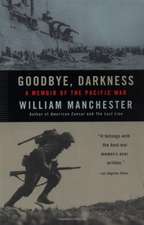The Arms of Krupp: The Rise and Fall of the Industrial Dynasty That Armed Germany at War
Autor William Manchesteren Limba Engleză Paperback – 3 mar 2003
Preț: 184.53 lei
Nou
Puncte Express: 277
Preț estimativ în valută:
35.31€ • 36.87$ • 29.22£
35.31€ • 36.87$ • 29.22£
Carte disponibilă
Livrare economică 14-28 martie
Preluare comenzi: 021 569.72.76
Specificații
ISBN-13: 9780316529402
ISBN-10: 0316529400
Pagini: 992
Dimensiuni: 152 x 232 x 41 mm
Greutate: 1.02 kg
Ediția:Reprint
Editura: Little, Brown and Company
Colecția Back Bay Books
Locul publicării:United States
ISBN-10: 0316529400
Pagini: 992
Dimensiuni: 152 x 232 x 41 mm
Greutate: 1.02 kg
Ediția:Reprint
Editura: Little, Brown and Company
Colecția Back Bay Books
Locul publicării:United States
Notă biografică
William Manchester was a hugely successful popular historian and biographer whose books include The Last Lion, Volumes 1 and 2, Goodbye Darkness, A World Lit Only by Fire, The Glory and the Dream, The Arms of Krupp, American Caesar, The Death of the President, and assorted works of journalism.
Descriere
For the first time in Trade Paperback the massive, compelling book in which William Manchester brings to life Europe's richest, most powerful family, a 400-year dynasty that armed Germany in three major wars. Their cannon won the Franco-Prussian War in 1870. In 1871 they invented the first anti-aircraft gun to shoot down observation balloons. In WWI their mammoth weapons shelled Paris at a range of 81 miles. For 40 years they manufactured submarines, beginning with the U-1 that menaced Allied shipping. In 1940 their cannon actually shelled England from across the channel. The Krupps armed the forces of the Kaiser and financed Hitler's 'Terror Election' of 1933. Hitler honoured their loyalty by decreeing special tax exemptions that continued to bind a post-war West Germany. The Krupps even survived a Nuremberg conviction to become the dynamo behind the 'Common Market'.









